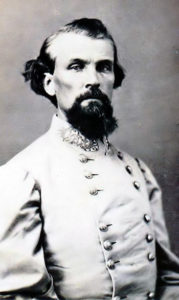
Nathan Forest
*On this date in 1821, Nathan Forrest was born. He was a white-American slave trader and Confederate army officer.
Nathan Bedford Forrest was born into a poor settler family in a secluded frontier cabin near Chapel Hill, Tennessee. He was the first son of Mariam (Beck) and William Forrest. His father, William, was of English descent, and his mother, Mariam, was of English descent. He and his twin sister, Fanny, were the two eldest of blacksmith William Forrest's 12 children with his wife, Miriam Beck.
Forrest's family lived in a log house (now preserved as the Nathan Bedford Forrest Boyhood Home) from 1830 to 1833. William Forrest worked as a blacksmith in Tennessee until 1834, when he moved to Mississippi. William died in 1837, and Forrest became the primary caretaker of the family at the age of 16. In 1841, he went into business with his uncle Jonathan Forrest in Hernando, Mississippi. His uncle was killed there in 1845 during an argument with the Matlock brothers. In retaliation, Forrest shot and killed two of them with his two-shot pistol and wounded two others with a knife thrown at him. One of the injured Matlock men survived and served under Forrest during the American Civil War.
In 1845, Forrest married Mary Ann Montgomery, the niece of a Presbyterian minister who was her legal guardian. They had two children, William Montgomery Bedford Forrest, who enlisted at 15 and served alongside his father in the war, and a daughter, Fanny, who died in childhood. In June 1861, he enlisted in the Confederate Army. He was one of the few officers during the war to enlist as a private and be promoted to general without any prior military training. An expert cavalry leader, Forrest was given command of a corps and established new doctrines for mobile forces, earning the nickname "The Wizard of the Saddle." His methods influenced future military strategists, although some commentators see the Confederate high command as underutilizing his talents.
On April 12, 1864, in what has been called "one of the bleakest, saddest events of American military history," troops under Forrest's command massacred Union troops who had surrendered, most of them Black soldiers along with some white Tennesseans fighting for the Union, at the Battle of Fort Pillow. Forrest was blamed for the massacre in the Union press, and that news may have strengthened the North's resolve to win the war. Forrest was an early member of the Ku Klux Klan, formed by six veterans of the Confederate Army in Pulaski, Tennessee, during the spring of 1866, and soon expanded throughout the state and beyond.
As a former slave trader and slave owner, Forrest experienced the abolition of slavery at the war's end as a significant financial setback. He became interested in the area around Crowley's Ridge during the war and took up civilian life in 1865 in Memphis, Tennessee. Although scholars generally respect Forrest as a military strategist, he has remained a controversial figure in Southern racial history, especially for his role in the massacre of black soldiers at Fort Pillow and his leadership of the Ku Klux Klan.
Forrest testified before the Congressional investigation of Klan activities in 1871. He denied membership, but his role in the KKK was beyond the scope of the investigating committee; afterward, he admitted to 'gentlemanly lies.' He wanted nothing more to do with the Klan but felt honor-bound to protect former associates." Nathan Forrest reportedly died from acute complications of diabetes at the Memphis home of his brother Jesse on October 29, 1877.